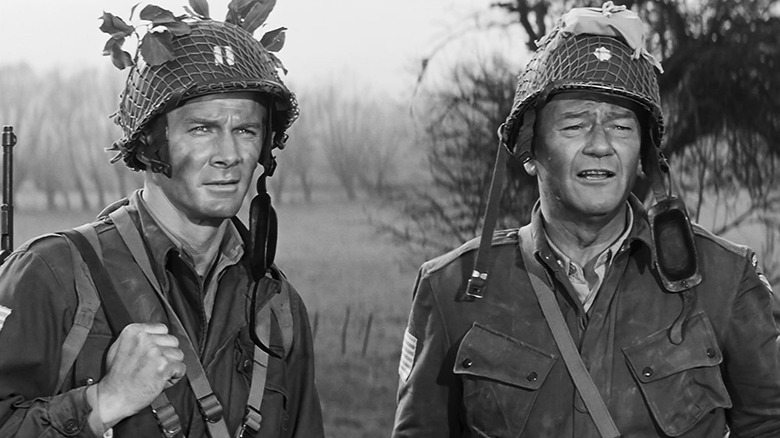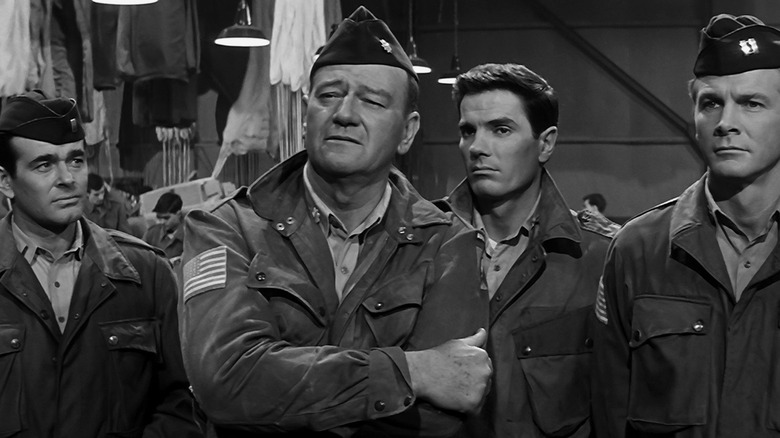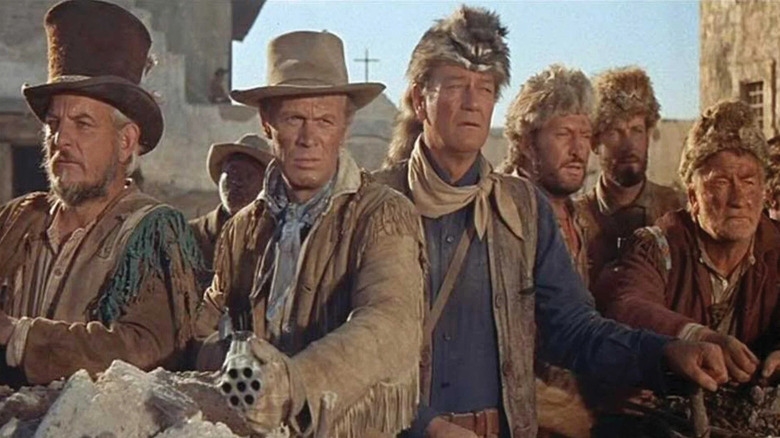A Fox Executive's Loose Lips Earned John Wayne A $250K Payday
The 1962 war epic "The Longest Day" starred the infamously brusque John Wayne as Lieutenant Colonel Benjamin H. Vandervoort, a real-life American soldier who was present for the titular "day," aka D-Day. Wayne was 55 at the time of filming, however, making him a full 28 years older than Vandervoort was on June 6, 1944. Wayne was still a major star, though, so the filmmakers simply had to ignore the massive age gap.
The studios also had to begrudgingly pay Wayne a massive $250,000 for his work, which was 10 times larger than most of the film's other stars. It seems that Wayne sought such a high salary not because of greed or ego, but out of spite. Wayne, you see, had a beef with 20th Century Fox executive Daryl F. Zanuck, and the actor wanted to actively butt heads with the CEO. It wasn't that Wayne wanted the money, he just wanted to make sure that Zanuck didn't have it.
Zanuck, it should be noted, was a notoriously lowly exec who badmouthed actors and openly whined about the changing state of Hollywood in the 1960s. He was a massive powerhouse in Hollywood, a remnant of the 1940s Studio System whose career lasted for multiple decades. Some have also credited Zanuck for the bleak invention of "casting couch" culture; several articles from 2017 — written in the wake of Harvey Weinstein's crimes being made public — alleged that Zanuck had an office where he would assault women in exchange for career favors.
In Scott Eyman's book "20th Century-Fox: Darryl F. Zanuck and the Creation of the Modern Film Studio," interviews with Zanuck reveal his sour attitudes and how they led directly to Wayne's retaliatory measures on "The Longest Day." Hollywood was never pretty.
Wayne wasn't happy about Zanuck's whining
Zanuck served as CEO of Fox from 1944 to 1956, and many credit his producing skill for the studio's success. He oversaw many utterly brilliant films ("All About Eve," and "Twelve O'Clock High" among them), and earned the studio multiple Academy Awards. This was from a time when a producer had a lot of creative control over film projects and could more closely guide (some might say micromanage) pictures to success. Zanuck left Fox in 1956 and tried to make it as an independent, but realized he would need studio backing to make his dream project, a D-Day film based on Cornelius Ryan's 1959 book "The Longest Day." He reluctantly returned to Fox in 1962 and set about making his epic.
At the time, Zanuck talked to famed gossip columnist Hedda Hopper about why he left Fox, claiming that cinema was changing for the worse. Notably, he felt that he wasn't being allowed to control projects anymore and that stars were commanding too much creative power. To quote:
"I just got ... fed up with being an executive and no longer being a producer. That's what the job became. Actors are now directing, writing and producing. Actors have taken over Hollywood completely with their agents. They want approval of everything: script, stars, still pictures. The producer hasn't got a chance to exercise any authority! Now, I've got great affection for Duke Wayne, but what right has he to write, direct and produce a motion picture? What right has Kirk Douglas got? What right has Widmark got? ... What the hell? I'm not going to work for them!"
Of course, Wayne, Douglas, and Richard Widmark all read the above interview, and none of them were happy.
Wayne made Zanuck pay (quite literally) for criticizing The Alamo
Zanuck, it seemed, longed for a time when actors had no control and producers reigned supreme. Actors, meanwhile, were happy that Hollywood had outgrown that era.
John Wayne produced his first film in 1947 with the release of "Angel and the Badman," and would move into second-unit directing with "The Quiet Man." His directorial debut was 1960's "The Alamo," wherein he played Davy Crockett, king of the wild frontier. "The Alamo" had a massive budget of $12 million, seen as extremely lavish at the time, and ran 202 minutes, making it a symbol of continued Hollywood bloat (this was only a few years before the notoriously bloated "Cleopatra" hobbled Fox). Wayne seemingly had trouble getting it made. The film wasn't a massive hit, but it made money, netting about $20 million in North America.
Evidently, Zanuck openly criticized "The Alamo" and pointed to it as proof that actors should not direct. This, too, was a comment that Wayne would remember when the producer invited the actor to appear in "The Longest Day." Yes, Wayne said he'd be in Zanuck's war epic, but only if he was paid 10 times more than the other stars. Zanuck, needing a star of Wayne's stature, swallowed his pride and paid out.
"The Longest Day" was nominated for five Academy Awards for Special Effects, Editing, Cinematography, Direction, and Picture, winning Effects and Cinematography. It lost Best Picture to "Lawrence of Arabia."


